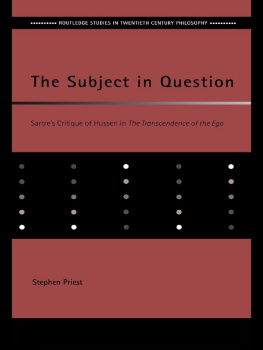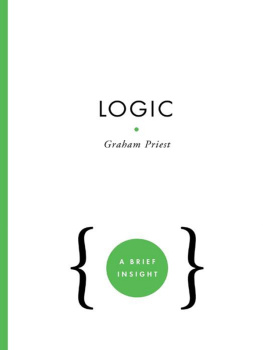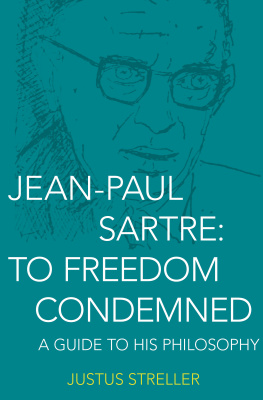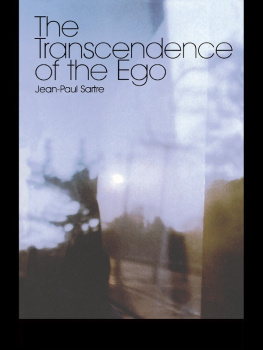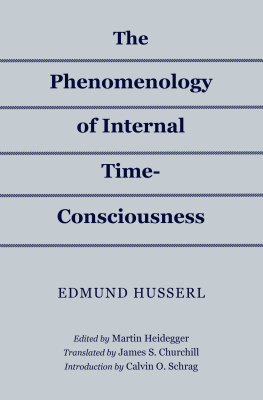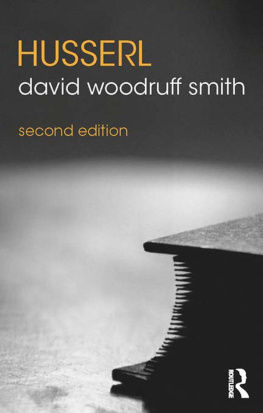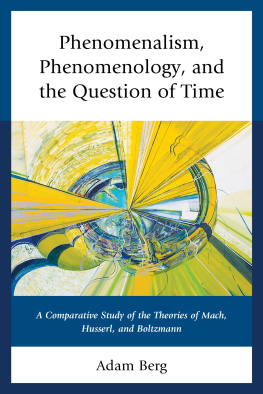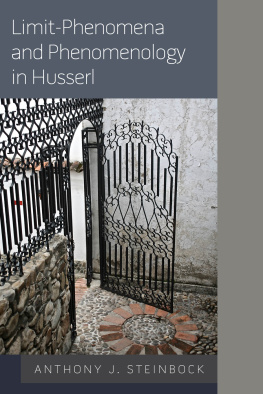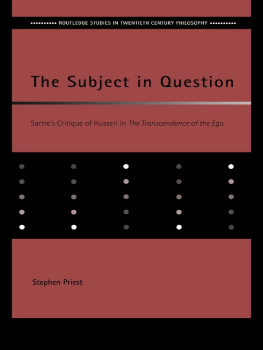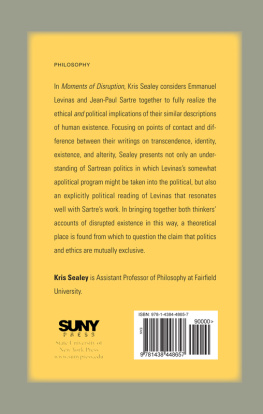Priest - The Subject in Question Sartres Critique of Husserl in The Transcendence of the Ego
Here you can read online Priest - The Subject in Question Sartres Critique of Husserl in The Transcendence of the Ego full text of the book (entire story) in english for free. Download pdf and epub, get meaning, cover and reviews about this ebook. City: London, year: 2014;2011, publisher: Routledge, genre: Science. Description of the work, (preface) as well as reviews are available. Best literature library LitArk.com created for fans of good reading and offers a wide selection of genres:
Romance novel
Science fiction
Adventure
Detective
Science
History
Home and family
Prose
Art
Politics
Computer
Non-fiction
Religion
Business
Children
Humor
Choose a favorite category and find really read worthwhile books. Enjoy immersion in the world of imagination, feel the emotions of the characters or learn something new for yourself, make an fascinating discovery.
The Subject in Question Sartres Critique of Husserl in The Transcendence of the Ego: summary, description and annotation
We offer to read an annotation, description, summary or preface (depends on what the author of the book "The Subject in Question Sartres Critique of Husserl in The Transcendence of the Ego" wrote himself). If you haven't found the necessary information about the book — write in the comments, we will try to find it.
The Subject in Question Sartres Critique of Husserl in The Transcendence of the Ego — read online for free the complete book (whole text) full work
Below is the text of the book, divided by pages. System saving the place of the last page read, allows you to conveniently read the book "The Subject in Question Sartres Critique of Husserl in The Transcendence of the Ego" online for free, without having to search again every time where you left off. Put a bookmark, and you can go to the page where you finished reading at any time.
Font size:
Interval:
Bookmark:

It is clearly and lucidly written. The theses are clearly formulated, and the arguments clearly laid out. The relations to Kant, Descartes, and some elements of contemporary philosophy make the work still more interesting There is nothing in the literature like it.
J.H.Mohanty, Emory University
The Subject in Question provides a fascinating insight into the difference between two of the twentieth centurys most famous philosophers over the key notions of conscious experience and the self. Jean-Paul Sartres The Transcendence of theEgo, published in 1937, is a major text in the phenomenological tradition and sets the course for much of Sartres later thought. The Subject in Question is the first full-length study of this famous work and its influence on twentieth-century philosophy. It also investigates the relationship between Sartres ideas and the earlier work of Descartes and Kant.
The key theme in The Transcendence of the Ego is Sartres hostility to any essentialist conception of the self. In opposition to Edmund Husserl, the founder of phenomenology, Sartre argues that the ego is not the inner source of ones actions, emotions or character, but rather a construct, a product of ones self-image in the eyes of others. Stephen Priest skilfully shows how Sartre construes consciousness as not essentially Cartesian, but as impersonal, always directed at something other than itself.
The Subject in Question sheds important new light on debates over consciousness and the legacy of Descartes and Kant, the nature of selfhood and personal identity, and the development of the phenomenological tradition.
Stephen Priest is Reader in Philosophy at the University of Edinburgh and a Visiting Scholar of Wolfson College, Oxford. He is the author of The British Empiricists (1990), Theories of the Mind (1991) and Merleau-Ponty (Routledge, 1998), and editor of Hegels Critique of Kant (1987/1992) and Jean-Paul Sartre: BasicWritings (Routledge, 2000).
1. The Story of Analytic Philosophy
Plot and heroes
Edited by Anat Biletzki and Anat Matar
2. Donald Davidson
Truth, meaning and knowledge
Edited by Urszula M.egle
3. Philosophy and Ordinary Language
The bent and genius of our tongue
Oswald Hanfling
4. The Subject in Question
Sartres critique of Husserl in The Transcendence of the Ego
Stephen Priest
The Transcendence of the Ego
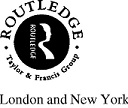
To my mother: Peggy Priest
First published 2000
by Routledge
11 New Fetter Lane, London EC4P 4EE
Simultaneously published in the USA and Canada
by Routledge
29 West 35th Street, New York, NY 10001
Routledge is an imprint of the Taylor & Francis Group
This edition published in the Taylor & Francis e-Library, 2004.
2000 Stephen Priest
All rights reserved. No part of this book may be reprinted or reproduced or utilised in any form or by any electronic, mechanical, or other means, now known or hereafter invented, including photocopying and recording, or in any information storage or retrieval system, without permission in writing from the publishers.
British Library Cataloguing in Publication Data
A catalogue record for this book is available from the British Library
Library of Congress Cataloging in Publication Data
Priest, Stephen.
The subject in question: Sartres critique of Husserl in The transcendence of the ego/Stephen Priest.
p. cm.(Routledge studies in twentieth century philosophy)
Includes bibliographical references and index.
1. Sartre, Jean Paul, 1905 Transcendance de lego. 2. Existentialism.
3. Phenomenology. 4. Consciousness. I. Title. II. Series.
B2430.S33 T736 2000
111dc21 99058540
ISBN 0-203-46143-6 Master e-book ISBN
ISBN 0-203-76967-8 (Adobe eReader Format)
ISBN 0-415-21369-X (Print Edition)
Consider for a moment some differences between you and everybody else. You look out of your own eyes but you look at or into other peoples eyes. You have never seen your own face, nor the back of your own head. In the case of just one human body (the one called your own) you feel yourself to be wholly or largely co-extensive with it. Perhaps you are inside your body or perhaps you are your body, looking out of it. In just this body but nobody elses you experience sensations and thoughts. The rest of the world seems physically arranged around you, with your body at its centre. You cannot in the normal course of things encounter your body as one object amongst others in the external world. This, on the other hand, is just how we encounter other peoples bodies, as living, speaking, expressive, but as over there.
These strange yet intimate phenomenological and physical facts are symptomatic of being oneself. We are so used to thinking in a general or abstract way that we fail to notice that something is me. Once noticed, this fact is at once obvious and extremely puzzling. For many people, for much of their lives, being what they are is an obstacle to noticing what they are.
Noticing ones own existence as ones own makes possible the understanding of a group of profound and interrelated philosophical questions: What is it for something to be me? Why is something me? What exactly have I claimed about somethinga mind, a brain, a body, a whole human beingwhen I have claimed that it is me?
What am I? does not necessarily capture the question. I am no doubt many things (a human being, a man, a biological organism, a thing that thinks, the only person born in that place at that time, the only person with that genetic make-up, etc.). The problem is that none of these facts says what it is for that thing to be me. What am I? does capture the question if it means What is it for something to be me?
The prospects for scientific attempts to answer these questions look grim. This is partly because descriptions of my existence and the theories of science are antithetical: I have a capacity to make choices, science is essentially deterministic. I have a past, present and future, science is tenseless. I have a psychological interiority, science only ever explains physical exteriority. Science cannot explain me because I am the opposite of what science says there is.
Is there, then, a cogent phenomenology of the self; a phenomenology which grounds the physical asymmetries between me and other people? Although Husserl, Heidegger, Sartre and Merleau-Ponty offer phenomenologies of the self which are putatively more fundamental than science, these do not form a homogeneous body of doctrine. The phenomenologists argue against one another. Sartres first substantial philosophical work, The Transcendence of the Ego, is an attempt to refute the answer to What am I? provided by Edmund Husserl in his transcendental phenomenology and replace it with a better one. Here I try to decide whether he succeeds, and see whether either Husserl or Sartre can shed any light on what it is for something to be me.
Font size:
Interval:
Bookmark:
Similar books «The Subject in Question Sartres Critique of Husserl in The Transcendence of the Ego»
Look at similar books to The Subject in Question Sartres Critique of Husserl in The Transcendence of the Ego. We have selected literature similar in name and meaning in the hope of providing readers with more options to find new, interesting, not yet read works.
Discussion, reviews of the book The Subject in Question Sartres Critique of Husserl in The Transcendence of the Ego and just readers' own opinions. Leave your comments, write what you think about the work, its meaning or the main characters. Specify what exactly you liked and what you didn't like, and why you think so.

